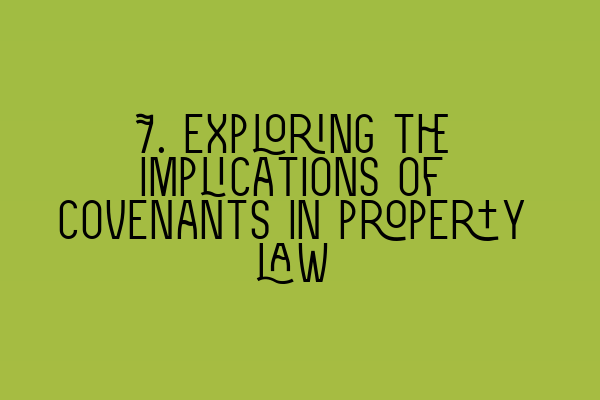7. Exploring the Implications of Covenants in Property Law
Welcome to the SQE Property Law Blog, where we delve into various aspects of property law and land law. In this post, we will explore the implications of covenants in property law, examining their significance, types, and enforcement. Whether you are a property owner, tenant, or legal professional, understanding covenants is essential to navigating the complexities of property transactions. Let’s get started!
1. What are Covenants in Property Law?
In property law, a covenant refers to a legally binding agreement between parties that outlines certain rights and obligations regarding the use and enjoyment of land. These agreements are commonly found in property deeds, leases, and other legal documents. Covenants serve as a means to regulate and manage the relationship between landowners and are enforceable by law.
There are two primary types of covenants: positive covenants and negative covenants. Positive covenants obligate the party to perform specific actions, while negative covenants restrict certain activities or behaviors. It is important to distinguish between the two when drafting or reviewing property agreements.
2. Implications of Covenants
Covenants in property law have several implications, both for the landowner and any subsequent owners. They can affect the use, development, and value of the land. Understanding these implications is crucial for making informed decisions and avoiding legal disputes.
Some common implications of covenants include:
- Restrictions on Use: Negative covenants may limit the activities that can be performed on the land, such as prohibiting certain business operations or constraining construction.
- Responsibility for Maintenance: Covenants may assign responsibilities for the maintenance and repair of shared structures, roads, or utilities to landowners within a specific area or community.
- Shared Amenities: Covenants can establish shared amenities, such as swimming pools, parks, or community centers, and define the rights and responsibilities of those who may utilize them.
- Preservation of Character: Covenants may aim to preserve the architectural or cultural integrity of a particular neighborhood or development by regulating building designs or materials used.
3. Enforcement of Covenants
Ensuring compliance with covenants is crucial to maintaining the integrity of property agreements and the rights of all parties involved. If a party fails to adhere to the terms of a covenant, enforcement actions can be taken.
The methods of enforcement may include:
- Legal Action: The affected party can take legal action to seek damages or an injunction to prevent the violation of the covenant.
- Neighborhood Associations: In the case of covenants governing properties within a collective development, neighborhood associations or homeowners’ associations may play a role in enforcing the agreements.
- Indemnity Insurance: Some property transactions may involve obtaining indemnity insurance to protect against any breaches of covenants.
It is crucial for property owners, tenants, and legal professionals to be aware of the mechanisms available for enforcing covenants and protecting their rights in case of violations.
4. Professional Guidance and Expertise
Given the intricate nature of covenants in property law, seeking professional guidance and expertise is highly recommended. By consulting with experienced solicitors who specialize in property law, you can navigate the complexities of covenants more effectively and ensure compliance with relevant legal obligations.
SQE Property Law & Land Law offers comprehensive legal services and expert advice regarding property transactions, covenants, and other aspects of property law. Our team of dedicated solicitors has extensive experience in handling all types of property matters and can provide tailored solutions to meet your specific needs.
To further enhance your understanding of property law, we offer SQE 1 Preparation Courses and SQE 2 Preparation Courses. These courses are designed to equip aspiring legal professionals with the knowledge and skills required to excel in the SQE exams.
If you are preparing for the SQE exams, we also offer SQE 1 Practice Exam Questions and SQE 1 Practice Mocks FLK1 FLK2. These resources provide valuable practice and help you familiarize yourself with the format and content of the examinations.
Stay updated with the latest SRA SQE Exam Dates and make sure you are well-prepared for the upcoming exams.
Conclusion
Covenants play a significant role in property law, shaping the rights, obligations, and relationships between landowners. Understanding the implications and enforcement mechanisms associated with covenants is essential for property owners, tenants, and legal professionals alike.
To ensure compliance with covenants and protect your rights, it is advisable to seek professional guidance and expertise. At SQE Property Law & Land Law, we are committed to providing comprehensive legal services and expert advice tailored to your needs.
Contact us today to learn more about our services and how we can assist you with your property law matters.
